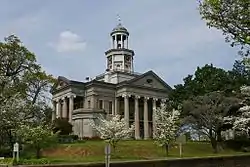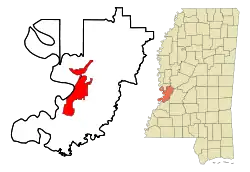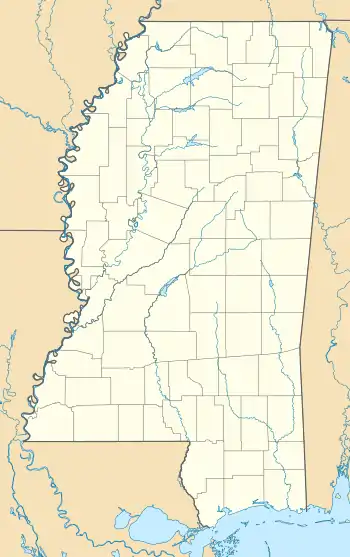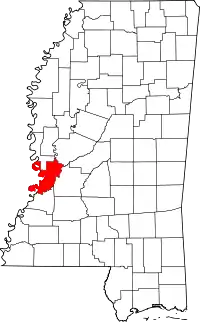Vicksburg, Mississippi
Vicksburg is a historic city in Warren County, Mississippi, United States. It is the county seat, and the population as of 2020 was 21,573.
Vicksburg, Mississippi | |
|---|---|
 Old Warren County Courthouse ("Old Courthouse Museum") | |
| Nicknames: | |
 Location of Vicksburg in Warren County, Mississippi (left) and of Warren County in Mississippi | |
 Vicksburg, Mississippi Location of Vicksburg in Mississippi  Vicksburg, Mississippi Vicksburg, Mississippi (the United States) | |
| Coordinates: 32°20′10″N 90°52′31″W | |
| Country | United States |
| State | Mississippi |
| County | Warren |
| Incorporated | February 15, 1839 |
| Named for | Newitt Vick |
| Government | |
| • Mayor | George Flaggs Jr. |
| Area | |
| • City | 35.09 sq mi (90.89 km2) |
| • Land | 33.02 sq mi (85.51 km2) |
| • Water | 2.08 sq mi (5.38 km2) |
| Elevation | 240 ft (82 m) |
| Population (2020) | |
| • City | 21,573 |
| • Density | 653.39/sq mi (252.28/km2) |
| • Metro | 57,433 (US: 162nd) |
| Time zone | UTC−6 (CST) |
| • Summer (DST) | UTC−5 (CDT) |
| ZIP Codes | 39180-39183 |
| Area code(s) | 601 and 769 |
| FIPS code | 28-76720 |
| GNIS feature ID | 0679216 |
| Website | City of Vicksburg |

.jpg.webp)
Located on a high bluff on the east bank of the Mississippi River across from Louisiana, Vicksburg was built by French colonists in 1719, and the outpost withstood an attack from the native Natchez people. It was incorporated as Vicksburg in 1825 after Methodist missionary Newitt Vick.
During the American Civil War, it was a key Confederate river-port, and its July 1863 surrender to Ulysses S. Grant, along with the concurrent Battle of Gettysburg, marked the turning-point of the war. The city is home to three large installations of the United States Army Corps of Engineers, which has often been involved in local flood control.
History
The area that is now Vicksburg was long occupied by the Natchez Native Americans as part of their historical territory along the Mississippi. The first Europeans who settled the area were French colonists who built Fort Saint Pierre in 1719 on the high bluffs overlooking the Yazoo River at present-day Redwood. They conducted fur trading with the Natchez and others, and started plantations.
Geography
According to the U.S. Census Bureau, the city has a total area of 35.3 sq mi (91 km2), of which 32.9 sq mi (85 km2) are land and 2.4 sq mi (6.2 km2) (6.78%) are covered by water.
Vicksburg is located at the confluence of the Mississippi and Yazoo Rivers. Much of the city is on top of a high bluff on the east bank of the Mississippi River. Vicksburg is also served by Interstate 20. The interstate opens Vicksburg with a cloverleaf interchange that heads out to U.S. Route 61 North towards Rolling Fork, Mississippi, Clarksdale, Mississippi, and stretches out for another 77 miles towards Memphis, Tennessee. On the south part of the exit, it heads on Mississippi Highway 27 towards Utica, Mississippi. As the interstate goes on it makes interchanges with Clay Street, Indiana Avenue, and Halls Ferry Road. After the downtown interchanges are over, before finally crossing in Louisiana with a cloverleaf interchange, I-20 makes a directional T interchange with US-61, and US-61 heads south toward Port Gibson, Mississippi, Natchez, Mississippi, and then continues for another 92 miles into Baton Rouge, Louisiana, Louisiana's capital city. Interstate 20 then continues to head west towards Monroe, Louisiana, Shreveport, Louisiana, Dallas, and lastly after 445 miles, making a trumpet interchange with Interstate 10 in Toyah, Texas.
Climate
Vicksburg has a humid subtropical climate with mild winters and hot, humid summers.
| Climate data for Vicksburg, Mississippi (Vicksburg – Tallulah Regional Airport) 1991–2020 normals, extremes 1948–present | |||||||||||||
|---|---|---|---|---|---|---|---|---|---|---|---|---|---|
| Month | Jan | Feb | Mar | Apr | May | Jun | Jul | Aug | Sep | Oct | Nov | Dec | Year |
| Record high °F (°C) | 81 (27) |
86 (30) |
89 (32) |
92 (33) |
97 (36) |
102 (39) |
104 (40) |
106 (41) |
105 (41) |
98 (37) |
88 (31) |
83 (28) |
106 (41) |
| Mean maximum °F (°C) | 76 (24) |
79 (26) |
83 (28) |
87 (31) |
91 (33) |
95 (35) |
97 (36) |
98 (37) |
96 (36) |
90 (32) |
82 (28) |
78 (26) |
99 (37) |
| Average high °F (°C) | 57.2 (14.0) |
61.9 (16.6) |
69.6 (20.9) |
76.9 (24.9) |
84.3 (29.1) |
90.2 (32.3) |
92.6 (33.7) |
92.8 (33.8) |
88.4 (31.3) |
79.1 (26.2) |
67.8 (19.9) |
59.6 (15.3) |
76.7 (24.8) |
| Daily mean °F (°C) | 47.6 (8.7) |
51.8 (11.0) |
59.1 (15.1) |
66.2 (19.0) |
73.9 (23.3) |
80.4 (26.9) |
82.8 (28.2) |
82.4 (28.0) |
77.2 (25.1) |
66.6 (19.2) |
55.9 (13.3) |
49.7 (9.8) |
66.1 (18.9) |
| Average low °F (°C) | 37.9 (3.3) |
41.7 (5.4) |
48.7 (9.3) |
55.5 (13.1) |
63.5 (17.5) |
70.6 (21.4) |
73.1 (22.8) |
72.0 (22.2) |
66.1 (18.9) |
54.0 (12.2) |
44.0 (6.7) |
39.7 (4.3) |
55.6 (13.1) |
| Mean minimum °F (°C) | 20 (−7) |
25 (−4) |
30 (−1) |
39 (4) |
49 (9) |
60 (16) |
66 (19) |
63 (17) |
51 (11) |
36 (2) |
27 (−3) |
23 (−5) |
18 (−8) |
| Record low °F (°C) | −2 (−19) |
−12 (−24) |
11 (−12) |
28 (−2) |
37 (3) |
47 (8) |
54 (12) |
52 (11) |
34 (1) |
22 (−6) |
15 (−9) |
4 (−16) |
−12 (−24) |
| Average precipitation inches (mm) | 5.44 (138) |
5.11 (130) |
5.02 (128) |
5.96 (151) |
3.85 (98) |
3.74 (95) |
4.05 (103) |
3.75 (95) |
3.00 (76) |
4.13 (105) |
3.92 (100) |
5.38 (137) |
53.35 (1,355) |
| Average snowfall inches (cm) | 0.1 (0.25) |
0.2 (0.51) |
0 (0) |
0 (0) |
0 (0) |
0 (0) |
0 (0) |
0 (0) |
0 (0) |
0 (0) |
trace | trace | 0.1 (0.25) |
| Average precipitation days (≥ 0.01 in) | 9.3 | 10.1 | 9.9 | 8.4 | 9.5 | 9.1 | 9.7 | 9.4 | 6.8 | 7.5 | 8.7 | 10.1 | 108.5 |
| Source: NOAA[4][5] | |||||||||||||
Demographics
| Census | Pop. | Note | %± |
|---|---|---|---|
| 1850 | 3,678 | — | |
| 1860 | 4,591 | 24.8% | |
| 1870 | 12,443 | 171.0% | |
| 1880 | 11,814 | −5.1% | |
| 1890 | 13,373 | 13.2% | |
| 1900 | 14,834 | 10.9% | |
| 1910 | 20,814 | 40.3% | |
| 1920 | 18,072 | −13.2% | |
| 1930 | 22,943 | 27.0% | |
| 1940 | 24,460 | 6.6% | |
| 1950 | 27,948 | 14.3% | |
| 1960 | 29,143 | 4.3% | |
| 1970 | 25,478 | −12.6% | |
| 1980 | 25,434 | −0.2% | |
| 1990 | 20,908 | −17.8% | |
| 2000 | 26,407 | 26.3% | |
| 2010 | 23,856 | −9.7% | |
| 2020 | 21,573 | −9.6% | |
| U.S. Decennial Census[6] 2018 Estimate[7] | |||
| Race | Num. | Perc. |
|---|---|---|
| White | 5,974 | 27.69% |
| Black or African American | 14,423 | 66.86% |
| Native American | 27 | 0.13% |
| Asian | 209 | 0.97% |
| Other/Mixed | 537 | 2.49% |
| Hispanic or Latino | 403 | 1.87% |
As of the 2020 United States census, there were 21,573 people, 8,969 households, and 4,864 families residing in the city.
Economy
In 2017, Emma Green of The Atlantic stated, "The Army Corps of Engineers sustains the town economically".[9]
12.3% of the local workforce is employed by the federal government.[10]
Casinos
Vicksburg is the home of four casinos along the Mississippi River.
- Ameristar Casino Vicksburg
- Casino Vicksburg (formerly Lady Luck Casino Vicksburg)
- Riverwalk Casino Hotel
- Water View Casino
Arts and culture
Annual cultural events
Every summer, Vicksburg plays host to the Miss Mississippi Pageant and Parade. Also every summer, the Vicksburg Homecoming Benevolent Club hosts a homecoming weekend/reunion that provides scholarships to graduating high-school seniors. Former residents from across the country return for the event.
Every spring and summer, Vicksburg Theatre Guild hosts Gold in the Hills, which holds the Guinness World Record for longest-running show.
Places of interest
- City Hall, a 1902 Beaux-Arts Classical Revival design by the architect James Riely Gordon.[11][12]
- Anchuca Mansion
- Balfour House
- McRaven House
- Old Court House Museum
- Vicksburg National Military Park
- Vicksburg Riverfront Murals
- Vicksburg Theatre Guild
Government
The city government consists of a mayor who is elected at-large and two aldermembers. The current mayor is George Flaggs Jr., who defeated former mayor Paul Winfield in the June 2013 election. The two aldermembers are elected from single-member districts, known as wards.
The city is home to three large US Army Corps of Engineers installations: the Engineer Research and Development Center (ERDC), which also houses the ERDC's Waterways Experiment Station; the Mississippi Valley Division headquarters; and the Vicksburg District headquarters.
The 412th Engineer Command of the US Army Reserve and the 168th Engineer Brigade of the Mississippi Army National Guard are also located in Vicksburg.
The United States Coast Guard's 8th District/Lower Mississippi River sector has an Aids To Navigation unit located in Vicksburg, operating the buoy tending vessel USCGC Kickapoo.[13]
Education

The City of Vicksburg is served by the Vicksburg-Warren School District.
High schools
- Vicksburg High School
- 1988–1989 National Blue Ribbon School[14]
- Warren Central High School
Junior high schools
- Vicksburg Junior High School
- Warren Central Junior High School
- Academy of Innovation
Elementary schools
- Beechwood Elementary School
- Bovina Elementary School
- Bowmar Avenue Magnet School
- Dana Road Elementary School
- Redwood Elementary School
- Sherman Avenue Elementary School
- South Park Elementary School
- Warrenton Elementary School
- Vicksburg Intermediate School
- Warren Central Intermediate School
Private schools
- Porters Chapel Academy
- Vicksburg Catholic School - St. Francis Xavier Elementary and Saint Aloysius Catholic High School (of the Roman Catholic Diocese of Jackson)
- Vicksburg Christian Academy
- Vicksburg Buddhist Fellowship
- Vicksburg Community School (K-12)
Former schools
- Hall's Ferry Road Elementary School
- 1985–1986, National Blue Ribbon School[14]
- Culkin Elementary School
- Jett Elementary School
- Cedars Elementary School
- Vicksburg Middle School
- All Saints' Episcopal School was a local boarding school located on Confederate Avenue, which closed in 2006 after 98 years in operation. The historic school is now a regional campus for AmeriCorps NCCC.
- St. Mary's Catholic School served the African-American community.
- McIntyre Elementary School served the African-American community.
- Magnolia Avenue School serviced the African-American community and was renamed Bowman High School to honor a former principal.
- Rosa A. Temple High School served the African-American community.
- King's Elementary School served the African-American community.
- Carr Central High School.
- J.H. Culkin Academy (grades 1-12 until 1965, thereafter Culkin Elementary School).
- H.V. Cooper High School. First graduating class 1959.
- Jefferson Davis School.
- Oak Ridge School.
- Eliza Fox School (a.k.a. Grove Street School).
- All Saints' College. An Episcopal college for white women. Opened in 1908 and closed in 1962.
Media
Transportation
The Yazoo and Mississippi Valley Railroad and then the Illinois Central Railroad for several decades had passenger service through the city, at two different stations, one on Levee Street, and the other on Cherry Street. The IC's Planter went north to Memphis, Tennessee and south to New Orleans. The Chery Street station hosted the Northeastern Limited and an unnamed train east to Jackson and Meridian (sleeping car passengers could continue to New York; coach passengers could transfer at Meridian's Union Station to an Atlanta and New York bound train there), and the Southwestern Limited and another train west to Monroe and Shreveport's Union Station.[17][18] The final train serving Vicksburg was the Southwestern Limited/Northeastern Limited in 1967.
Interstate 20 runs east–west through the southern part of Vicksburg. U.S. Highway 80 runs east–west through the city. U.S. Highway 61 runs north–south through the city.
The nearest airport with commercial flights is Jackson–Medgar Wiley Evers International Airport, 53.2 miles to the east of Vicksburg. Vicksburgh Tallulah Regional Airport and Vicksburg Municipal Airport, to the west and to the south of Vicksburg, are, on the other hand, two general aviation airports.
Notable people
- William Wirt Adams, Confederate Army officer and member of the Mississippi House of Representatives[19]
- Katherine Bailess, actress, singer and dancer
- Earle Basinsky, crime novelist
- Edwin C. Bearss (1923–2020), American Civil War historian
- Joseph A. Biedenharn (1866–1952), entrepreneur: first bottled Coca-Cola in 1894 at a location in Vicksburg[20]
- Johnny Brewer, football player
- Margaret Hunt Brisbane (1858–1925), poet
- Roosevelt Brown, former Major League Baseball outfielder for the Chicago Cubs
- William Denis Brown, III, lawyer, businessman, state senator from Monroe, Louisiana; born in Vicksburg in 1931[21]
- Ellis Burks, former MLB outfielder
- Charles Burnett, filmmaker
- Malcolm Butler, cornerback for the New England Patriots and Tennessee Titans
- Odia Coates, pop singer
- Rod Coleman, defensive tackle for the Atlanta Falcons
- Caroline Russell Compton, Mississippi artist[22]
- Mart Crowley, playwright, TV executive
- Jefferson Davis, President of the Confederate States of America (previously U.S. Congressman, Senator, Secretary of War)
- Bobby DeLaughter, Mississippi state judge and prosecutor
- Willie Dixon, blues bassist, singer, songwriter, and producer
- John "Kayo" Dottley, college All-American and professional football player
- Myrlie Evers-Williams, civil rights activist and journalist
- Mark Gray, country music singer, born in Vicksburg in 1952
- Louis Green, linebacker for the Denver Broncos
- DeMichael Harris, wide receiver for the Indianapolis Colts
- Milt Hinton, jazz bassist
- Jay Hopson, football head coach, University of Southern Mississippi
- Joseph Holt, longest-serving Judge Advocate General of the Army
- Delbert Hosemann Jr., Lt Governor of Mississippi and former Secretary of State
- Hank Jones, jazz pianist, born in Vicksburg
- Martin F. Jue, amateur radio products inventor, entrepreneur[23]
- Patrick Kelly, fashion designer
- Brad Leggett, football player, Seattle Seahawks center[24]
- George McConnell, former guitarist for Widespread Panic, Kudzu Kings, and Beanland
- William Michael Morgan, country music singer
- Michael Myers, defensive tackle for the Cincinnati Bengals
- Key Pittman, U.S. Senator from Nevada, 1913–40; born in Vicksburg
- Vail M. Pittman, 19th Governor of Nevada[25]
- Evelyn Preer, African-American film actress
- George Reed (1939-2023), former running back for the Saskatchewan Roughriders, CFL Hall of Fame member, Order of Canada member, Saskatchewan Order of Merit member
- Beah Richards, African-American film and television actress
- Kee Sloan, Episcopal priest and eleventh Bishop of Alabama
- Roy C. Strickland, businessman and politician in Louisiana and Texas, born in Vicksburg in 1942
- Taylor Tankersley, Florida Marlins relief pitcher
- John Thomas, former MLB player (Colorado Rockies, New York Mets, Texas Rangers, Atlanta Braves, Kansas City Royals)[26]
- Mary T. Washington, the first African-American woman CPA
- Carl Westcott, entrepreneur, founder of 1-800-Flowers and Westcott Communications
- Delmon Young, outfielder for the Philadelphia Phillies
- Dmitri Young, first baseman for the Washington Nationals
- Jaelyn Young, pleaded guilty to charges relating to her attempts to join ISIS[27]
Cultural references
- Vicksburg is mentioned in the Pulitzer Prize winning play Crimes of the Heart by Beth Henley.
- Several delta blues songs mention Vicksburg, for instance Charley Patton's "High Water Everywhere" and Robert Johnson's "Traveling Riverside Blues"
- The city is mentioned multiple times in the series of books surrounding the Logan family, including Roll of Thunder, Hear My Cry (1976) and Let The Circle Be Unbroken (1981), by Mildred Taylor.
- A made-for-TV movie version of I Know Why the Caged Bird Sings, based on Maya Angelou's memoir, was filmed in Vicksburg.
- O Brother, Where Art Thou? was filmed in Vicksburg. The Stokes campaign dinner was filmed in the Southern Cultural Heritage Center's auditorium.
- The hospital stairway scene from Mississippi Burning was filmed in the Southern Cultural Heritage Convent (with Gene Hackman and Willem Dafoe).
- Vicksburg is featured in Robert A. Heinlein's 1982 science fiction novel Friday as a town in the Lone Star Republic, a leading smugglers' port between Texas and the Chicago Imperium. The book's protagonist Friday Baldwin stayed there, particularly in the riverfront Lowtown, while trying to find a way into the Imperium.
- In the novel Underground to Canada the protagonists Julilly and Liza are slaves on a cotton plantation near Vicksburg.
- Vicksburg was the focus of four episodes of the American television series Ghost Adventures during Season 19, with one episode dedicated to Champion Hill Battlefield.
- On Elton John's 1974 album Caribou, the song Dixy Lily contains the lyrics "Down from Louisiana on the Vicksburg run." in the chorus.
See also
- USS Vicksburg, 5 ships
References
- "Mississippi's Rock of Gibraltar". Americas Library. Retrieved January 25, 2022.
- "Vicksburg, Mississippi Road Trip Guide". Road Trip USA. Retrieved February 13, 2023.
- "2020 U.S. Gazetteer Files". United States Census Bureau. Retrieved July 24, 2022.
- "NowData – NOAA Online Weather Data". National Oceanic and Atmospheric Administration. Retrieved May 16, 2021.
- "Station: Tallulah Vicksburg AP, LA". U.S. Climate Normals 2020: U.S. Monthly Climate Normals (1991-2020). National Oceanic and Atmospheric Administration. Retrieved May 16, 2021.
- "Census of Population and Housing". United States Census Bureau. Retrieved February 24, 2014.
- "Population Estimates". United States Census Bureau. Retrieved June 8, 2018.
- "Explore Census Data". data.census.gov. Retrieved December 9, 2021.
- Green, Emma (May 1, 2017). "How Two Mississippi College Students Fell in Love and Decided to Join a Terrorist Group". The Atlantic. Retrieved July 1, 2017.
- "See where federal workers live in the U.S." Washington Post. September 27, 2023. Retrieved September 29, 2023.
- "James Riely Gordon: An Inventory of his Drawings and Papers, ca. 1890-1937". Lib.utexas.edu. Retrieved June 13, 2014.
- "Two New Books For Your Architectural Library « Preservation in Mississippi". Misspreservation.com. October 5, 2011. Retrieved June 13, 2014.
- "Sector Lower Mississippi River Organization". Uscg.mil. Retrieved January 25, 2019.
- "Blue Ribbon Schools Program: Schools Recognized 1982–1983 Through 1999–2002" (PDF). Ed.gov. Archived (PDF) from the original on September 22, 2003. Retrieved January 25, 2019.
- Day., David (September 14, 2022). "Vicksburg Daily News". Vicksburg Daily News. Retrieved September 14, 2022.
- Reeves., Tim (May 23, 2018). "The Vicksburg Post". The Vicksburg Post. Retrieved March 12, 2021.
- "Illinois Central Railroad, Tables 40, 59". Official Guide of the Railways. National Railway Publication Company. 74 (1). June 1941.
- "Illinois Central Railroad, Table 18". Official Guide of the Railways. National Railway Publication Company. 98 (8). January 1966.
- Who Was Who in America, Historical Volume, 1607-1896. Chicago: Marquis Who's Who. 1963.
- "Scott Rogers, "Family imprint seen in Monroe a century after arrival", April 21, 2013". Monroe News-Star. Archived from the original on October 25, 2014. Retrieved April 22, 2013.
- "William Denis Brown, III". Monroe News-Star, March 9, 2012. Retrieved July 13, 2013.
- Mississippi Writers and Musicians—Mississippi Artists (Caroline Russell Compton) Archived 2015-04-11 at the Wayback Machine
- Coy, Steve (March 27, 2012). "How I Started MFJ and Its Very Early Days". Retrieved May 19, 2016.
- "Brad Leggett". DatabaseFootball.com. Archived from the original on October 18, 2012. Retrieved November 26, 2012.
- "Nevada Governor Vail Montgomery Pittman". National Governors Association. Retrieved October 6, 2012.
- "John Thomson Stats". Baseball Almanac. Retrieved November 26, 2012.
- Green, Emma (May 1, 2017). "How Two Mississippi College Students Fell in Love and Decided to Join a Terrorist Group". The Atlantic. Retrieved September 15, 2017.
Further reading
- Rothman, Joshua D.: Flush Times and Fever Dreams: A Story of Capitalism and Slavery in the Age of Jackson. Athens: University of Georgia Press, 2010.
- Cox, James L. The Mississippi Almanac. (2001). ISBN 0-9643545-2-7.
- History of Vicksburg's Jewish community
External links
- City of Vicksburg
- Vicksburg Chamber of Commerce
- . The American Cyclopædia. 1879.
- . Encyclopædia Britannica. Vol. XXIV (9th ed.). 1888. p. 211.
- . New International Encyclopedia. Vol. XX. 1905. p. 115.
